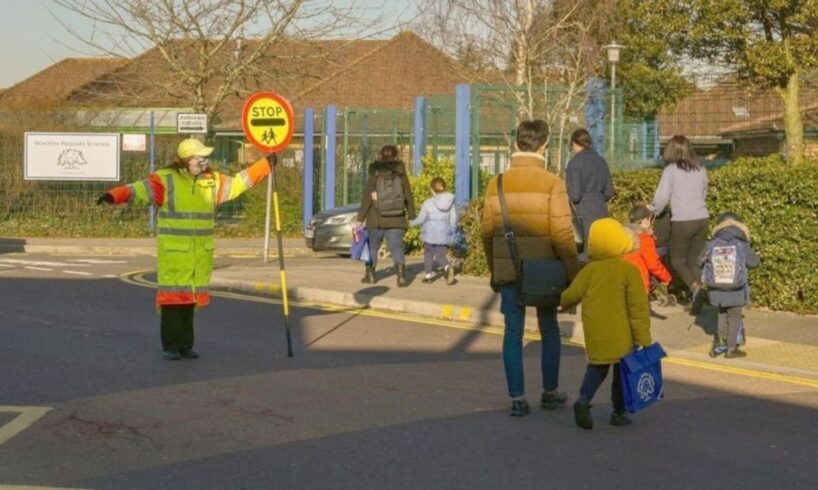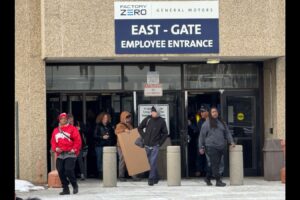
As the autumn school term begins in Britain, research reveals the devastating impact of inequality and poverty on the access to educational opportunities by children from poorer families.
A survey commissioned by the charity Child Poverty Action Group (CPAG) reveals that children on Free School Meals (FSM) were less likely to take up costlier subjects at GCSE level than their better off counterparts. Many subjects incur costs to be shouldered by parents, such as fieldwork in geography, foreign language trips, ingredients in domestic science, and kit and equipment for PE (physical education).
Parents take children to a primary school in Bournemouth, UK following the reopening of schools nationally. during the COVID pandemic, March, 2021
General Certificates of Secondary Education (GCSEs) are subjects taken by 15-16-year-olds with exams at the end of year 11. While English, maths and science are compulsory, other subjects are optional. The outcome of GCSE’s determines the next step in a child’s education.
An online poll commissioned by CPAG conducted between April 17 and May 1, 2025, by Survation of 1,701 secondary school pupils, including 1,027 children in England found:
· 23 percent of children on free school meals were deterred from selecting GCSE subjects of their choice because of fear of costs incurred, compared to 9 percent not on FSMs.
· 29 percent on FSMs said the costs of a subject informed their choice, compared to 11 percent not on FSMs.
· 30 percent of FSM pupils said homework costs were hard to afford, including laptops.
CPAG’s head of education policy Kate Anstey said, “Children in struggling families are going back to school only to be bounced out of some subjects and learning by costs—cut off from opportunities just as the foundations of their futures are being laid.”
The survey reported 15 percent of FSM children saying family income made learning more difficult (compared to 8 percent). Also, 14 percent (compared to 8 percent) said it was difficult to afford pens and pencils for lessons. Over a third (34 percent) reported difficulties affording school trips and 1 in 5 (compared to 21 percent) school clubs. And 27 percent on free school meals were barred from music tuition because of the cost of instruments.
Previous research by CPAG calculated that while state education is free in the UK, it actually costs families a minimum £2,274.77 annually to see a child through secondary school. This includes a minimum of £449.67 for calculators, stationery and revision guides.
In England, Free School Meals are restricted to children in reception, Year 1 and 2 and older children from families in the bottom income percentile. To qualify, the latter must live in a household whose income is £7,400 or below, excluding extra top-up benefits like Universal Credit. Families who qualify will have a total annual income including benefits of between £18,000–£24,000, according to the government.
From September 2026, all children from poor families receiving the Universal Credit benefit will qualify for FSMs, though this will hardly compensate for the rising prices of food, household bills and housing costs facing families.
There are around 2.2 million children (25.7 percent of the total pupil population) receiving free school dinners. All primary school children in Wales and London can access FSMs. In Scotland children receive free meals for the first five years of primary school.
The quality of school dinners has been subject to much criticism—the government funds a measly £2.61 per meal. The food is generally not cooked onsite but outsourced to private companies.
The statistics for child poverty in the UK are stark, in a country where the richest 50 families own more wealth than the poorest half of the population or 34 million people.
According to the Child Poverty Action Group, there are 4.5 million children in the UK living in relative poverty, defined as below 60 percent of the median income. This translates to 31 percent, or nine children in a classroom of 30, growing up in poverty. 7 out of 10 children in poor households have at least one parent in work, due to pitifully low wages. Among families where a member is disabled, 44 percent of children live in poverty.
Almost half (49 percent) of children from black and Asian families live in poverty, compared to 24 percent of children in white families. 49 percent of children from single-parent households also grow up in poverty.
The figure for child poverty has risen by 700,000 in the last 10 years, due to successive government austerity to pay for huge bank bailouts.
Governments have known for decades the correlation between poverty and educational attainment. This year’s GCSE results reaffirmed the persistent trend of deprivation leading to poorer exam outcomes. While 48 percent of GCSE results in private schools were above grade 7, just 18.2 percent were awarded the same high pass at non-selective state schools.
Beneath the cynical pose of closing the attainment-gap, successive governments over the past 40 years, facilitated by the education unions, introduced major “reforms” to UK education—including the proscriptive National Curriculum, Academy schools and hated government inspectorate Ofsted to police the teaching workforce. But what is needed is a fully funded education system, informed by child psychology and pedagogy, not driven by tests and targets that squash inquiry and creativity.
On taking office Labour declared as one of its missions to “break down barriers to opportunity… to make sure there is no class ceiling on the ambitions of our young people”. Prime Minister Keir Starmer declared his government would “leave no stone unturned to give every child the very best start in life”. Such comments were pure electioneering, with the punitive two-child benefit cap introduced by the Tories that has reduced many families to penury and stunts the life chances of children kept in place.
Capitalist governments worldwide have concluded that historic average spending on health, education and pensions is no longer affordable. Labour’s misnamed Schools and Well Being bill making its way through the House of Lords makes no mention of education funding, which has been cut to the bone. The government is dedicated to defending not the well-being of children but the profits of the rich and increased military spending.
The education unions, which welcomed the election of Labour, have suppressed the demands of teachers to fight for better pay and conditions. The National Education Union (NEU), after pushing through the last pay offer of 4 percent, declared its campaign this term is to make futile appeals to the government to fully fund the award. On its website, the NEU admits a £630 million shortfall, if schools are forced to fund the pay increase out of their dwindling budgets, meaning 12,400 job losses. If only the government would tax the rich, it states pathetically.
To fight for a fully funded education system, adequate SEND (special needs) support, small class sizes, fair pay for teaching staff, and an end child poverty requires a struggle for socialism. The wealth of society must be taken out of the hands of the rich and military spending must end.
Teachers and support staff are urged to contact and join the Educators Rank-and-File Committee today.
I want to discuss joining or building an educators rank-and-file committee:





